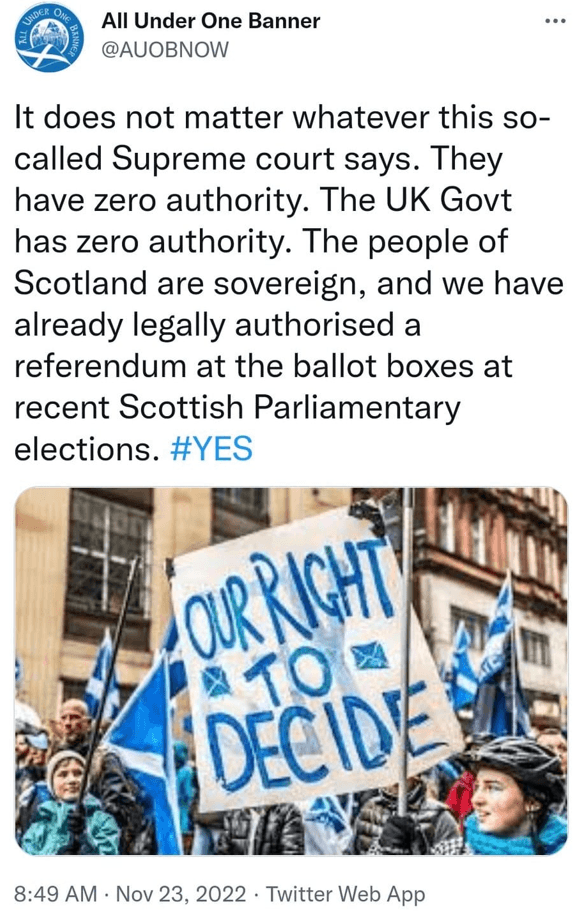By Gray Allen, Falkirk Labour member
Last Wednesday the UK Supreme Court stymied the attempt by the SNP to find a legal road to a second independence referendum. The court looked at the possibility of the Scottish Parliament passing a law for a second referendum that would be ‘consultative’.
The court decided that even if the vote was consultative, that the central issue is that it would still have a major impact on what they deemed was a matter reserved for the government of the United Kingdom, particularly if there were to be a majority in the ‘consultation’ for ‘Yes’.
Lord Reed, President of the Supreme Court, read out the ruling which said that a proposed Scottish Independence Referendum Bill coming before the Scottish Parliament would relate to reserved matters because it concerns the Union of the Kingdoms of Scotland and England and the powers of the Parliament of the United Kingdom. The court could have decided the whole thing was premature, since no such Bill had been agreed by the Scottish Parliament, but the five judges decided not to do so.
This decision was no surprise to anyone who had read the Scotland Act 1998, no matter how superficially. It is all the more astonishing, therefore, that the SNP were so surprised by the outcome. Or were they? It is far more likely that they were fully aware that this could have been the only possible outcome and were prepared well in advance to use it to re-energise their base. That base had become increasingly fractious since the Scottish General Election in 2021, and frustrated at the apparent timidity of Nicola Sturgeon and the SNP leadership over the independence campaign.
Plan for second referendum in 2023 now stymied
A decision that the whole case was premature would have suited the Tory Government, as that would have kicked the issue into the long grass and it would have then been up to the SNP to first get the legislation through Holyrood. Given that First Minister Sturgeon had already announced her intention to hold a second independence referendum in October 2023, any delay would have torpedoed her timetable.

As it is, the whole SNP plan has been blown out of the water. Sturgeon has now fallen back on her Plan B, which is to make the next UK general election a plebiscite on Scottish Independence. That begs a whole number of questions, not least all the other issues, besides independence, that bring workers out to vote. And then the question of turn-out arises. If the SNP were to win a majority of seats on a single-issue manifesto, but not get more than 50% of the vote, would that be seen as a sufficient mandate? And what kind of mandate? A mandate for a referendum or a mandate to negotiate independence?
A special SNP Conference is to be called in order to debate these questions, but in the meantime, they are not mentioned at the rallies and demonstrations called following Lord Reed’s announcement. Fourteen rallies were organised across Scotland with the predictable slogans: “Scotland is just a colony”, “The idea of a voluntary Union is a sham”, “democracy has been denied”, “Scots are shackled to Westminster”, “our right to self-determination has been denied”, and so on. Despite being warned about the inflammatory language being used by SNP spokespersons, the nationalist base is hardening, with a shitstorm on social media and flyposting in town centres.
However, there is also disappointment in the nationalist ranks, with turnout at rallies measures in the hundreds not the thousands that were expected. As one pro-independence campaigner in Glasgow tweeted, “OK there was a crowd of a few hundred at the rally and the atmosphere was good, but I was thoroughly disheartened. I had hoped that yesterday’s ruling might have ignited the fire of indignation in more people. In my view, indifference is as much a barrier to independence as opposition”.
Historical precedent of Sinn Fein vote in 1918
It remains to be seen whether the SNP tactic of using the next general election as a de facto referendum gains any ground. There are historical precedents for such a move. In the late nineteenth century, general elections were seen by many, including Lord Salisbury, as a way of deciding constitutional issues. In 1918, Sinn Fein took its landslide victory as a mandate to declare the Irish Republic and set up the Dail Eireann. There are no public pronouncements from the SNP leadership suggesting that they would follow the Sinn Fein example, although such demands can be heard from the pro-independence rank-and-file.

The SNP face two big problems with using the next general election as a plebiscite. Firstly, workers will face huge problems over the collapse in the standard of living and in the public services: vital issues that they will want sorted. Mass unemployment will be with us again. Working class voters may no longer be willing to play the nationalist game.
Secondly, it is very difficult under the first-past-the-post electoral system to win a majority of the popular vote. While the SNP could well win a majority of the Westminster parliamentary seats in Scotland, it is unlikely that they could get over 50% of the popular vote. Thirdly, the SNP have made a big issue out of the so-called inbuilt Tory majority in Westminster, for which Scotland has never voted. That argument is looking a bit thin at the moment, with Labour holding such a commanding lead in opinion polls. The SNP’s “soft” voters may see a general election more as an immediate opportunity of kicking the Tories out, rather than voting for an independent Scotland at some indeterminate point in the future.
And then there are the Greens. The Green Party position is to support Scottish independence, but that is not an uncontroversial policy. One of their former leaders, Robin Harper, supported the No Campaign. Patrick Harvie, current co-leader of the Scottish Greens, has said that “even very firm supporters of independence within the Greens are more strongly motivated by other aspects of our political agenda”
The SNP, however, co-opt all Green votes as votes in favour of independence, although many Green voters are primarily concerned about environmental rather than constitutional matters. Any pro-independence majority that depends on Green support will be challenged by the unionist parties. Alec Salmond’s Alba Party is a different case being, like the SNP, a nationalist party.
So, if the SNP use the next general election as a de facto referendum, it will resolve nothing. If the SNP win a majority of Scottish seats, their demand that this should mean a referendum or negotiations on independence have no legal force and are not binding. As the Supreme Court showed, there is no legal route out of this impasse. The SNP claim that the Union of 1707 was a voluntary one is accepted by all sides. But the Act of Union contained no mechanism for dissolving the Union. No-one at that time envisaged a possible future dissolution of the United Kingdom. The solution for the twenty-first century has to be a political one.
Labour acting as Little Sir Echo to the Tories
The Tory reaction so far to the demand for a second independence referendum (IndyRef2) has been to say, “now is not the time”. Unfortunately, in this, Labour acts as Little Sir Echo to the Tories. But Scottish Labour must go further and must now start discussions on how and under what circumstances IndyRef2 can go ahead. In principle, no socialist can be opposed to a referendum on the issue of independence, but the key issue for the labour movement, should it go ahead, is to avoid polarisation and division within the working class, both within Scotland and across Britain as a whole. According to a consistent pattern of opinion polls, Scottish voters are currently split almost 50:50 on the question, with a slight majority against independence. UK Labour must learn not to make blundering and ill-informed interventions in Scottish politics but come up with some radical ideas for the change of the UK Constitution.
Above all, Labour in the UK and in Scotland, has to base their fundamental policies on the economic and social issues that most dramatically affect workers. It will be those issues and not the constitution that will motivate workers and voters in general. It is the responsibility of Scottish Labour to advance policies that offer genuine and lasting improvements in the lives of workers and that can only be through socialist policies that challenge the land-owning, financial and industrial ruling class. Socialist policies are not secondary to the issue of the constitution: they have to be front and centre of any arguments and debates on the national question in Scotland.



